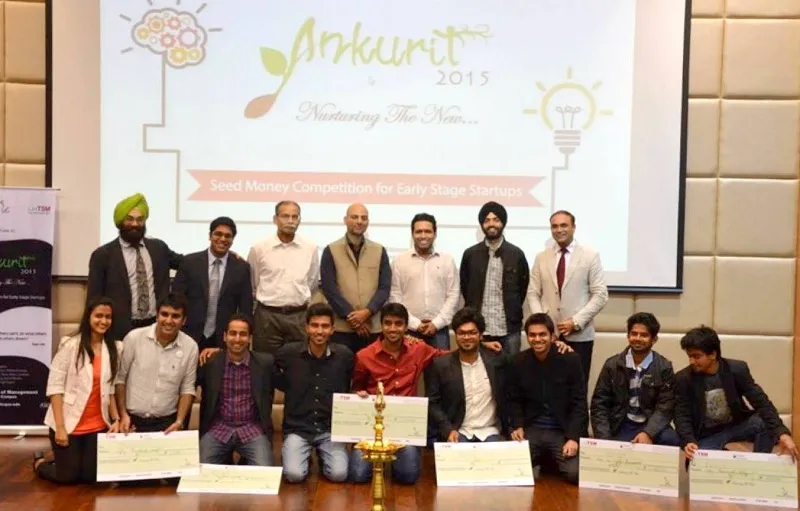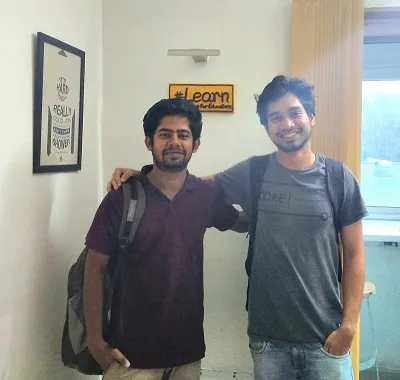How we built and sold a company while still in college
In January last year, I was on a train to the famed IIT Kharagpur, an institution that I always wanted to study in, for a business-plan competition. I’d invested Rs 10,000 on this trip and was hoping to make 10x returns on my investment. How was I planning to make the 10x returns? By winning, of course.
In a fast-paced startup environment, risks and high returns are two sides of the same coin. And when you are a student entrepreneur, the risk appetite is even larger.
What happened to the investment? Well, it failed, and it was not the first time, at least in terms of resources, time and effort. The thing about running a company whilst you are still in college is that these are valuable investments, and when they fail, it hurts. Yet, you do it again, despite the fact that you are living on a month-on-month basis on boiled eggs for dinner and travelling in broken buses across State lines.

There are moments you wonder why you are doing this to yourself. And most of those moments fade away because you remember how and why you started doing this.
1) The Eureka moment
You started it because you noticed a genuine problem your brother was struggling with and you realise that you had struggled with it too. You remember how, no matter how much you studied, after a point, your scores for your favourite entrance exam always plateaued. And when your sibling complains about the same thing, four years later, you wonder why tech hasn’t solved this yet.
So you decide to fix it yourself. Bring on board a few friends who can help you and you all start taking a crack at it together. After all, all that coding skills you picked up over the past few years by interning with different companies should help, right? Especially when you even have the knack for good ideas and always looked for creating value through beautiful products.
Or that’s what you strongly believe, until you go on to sell to someone, and you get a polite no. You then think maybe they aren’t a 'tech-friendly' educational institution.
Related read: An Open Letter to crazy 20 somethings who believe they can change the world
2) You pitch and pitch
You decide to come back from the setback and decide to pitch to more institutions. You want to impact the way millions of kids study, by showing them where exactly they are going wrong and helping them fix that instantly through this nifty SaaS solution that you have built.
However, all this hard work doesn’t yield anything again. You only get more no’s. You travel to more cities. The internship money you had earned and saved for travelling is now used for servers and commuting between different institutions and travelling to B-Plan competitions.
You call your dad and say that the world is unfair. You hadn’t done that in years and it helps to know you can still resort to old comforts in times of distress.

3) H for Hustle
Meanwhile, you get a little more hustle, you start talking to some people who may have experience in areas you don’t know. You don’t manage to fix all of them but you fix some loopholes. You at last start to realise where you were going wrong.
It helps that you get to bounce off these ideas with a new potential advisor/mentor you met and you conceptualise a new product based on mutual experiences. Things are suddenly starting to look up, because hope is addictive. Hell, both you and your co-founder travel to two different competitions and both of you win.
4) It’s ALIVE!
You christen your product and launch a shiny new landing page describing its different features, and showcase how a student can connect to a tutor in a few seconds and get his/her doubts solved via chat. Except you don’t map out the product timeline. You think of every possible edge case and try to build a feature set for all of those.
However, the landing page is doing great. There are lots of tutors signing up, friends and seniors whom you haven’t spoken to in ages start wishing you luck, and you feel you are onto something brilliant. Inevitably, a lot of analysts from different VC firms start reaching out to you. You haven’t built a product, you haven’t seen a real user, you haven’t earned a penny and yet you start taking these calls. These turn into meetings and you think something might actually work out. So you drag your co-founder with a broken foot also to a meeting all the way to Delhi.
5) Mentors, meetings, carry on, John
An hour later, you know they aren’t going to fund you even though they don’t say it explicitly. You have heard enough nays to know when it’s headed in that direction. But, you have gotten stuck in this loop, so you go through with the other meetings too. Obviously, they don’t work out either.
All this has only impacted the product because you realised you can do only a few things at a time and this was killing massive amount of time. You get back on track, code through the nights, keep up the cheerful face of your brand on social media and start taking those compulsory tests you have to take to pass courses.
Also read: These Manipal Grads were making Rs 30L in third year of college, then they decided to start up
6) A House of Cards?
It is starting to take a toll on you but you absorb it. You do it, because there are five juniors who gave up different internships and hoped for you to ensure that they can keep working on this. You still have no clue where the money will come from and figure all problems will be resolved when you launch and you do a closed beta. The reactions are good. Students and tutors love it but you know you need a little more time to release a good product.
You are quickly running out of time. It’s nearly the end of the semester and you still haven’t launched. No one has funded you. Two big players in the edtech space in India announce their huge funding rounds on the same day and you get even more worried.
7) The security blanket
Your advisor who has already raised a seed round offer to acquire you and you have a way out at last. But you and your co-founder debate for hours, weigh the pros and cons and finally over a cup of chai at 5 am decide to sell the company.
You knew it was early but you yearned for a sense of security after a brutal set of 10 months. Moreover, now you could ensure all your interns had an internship. You could see a lot of them making full-time offers and you are glad that everyone would be happy.
You start working in a small office, preparing for launch and sign all the documents over the next few weeks. Someone tells you that you are the first ones in 50 years of BITSian history to have sold a company while in college.

You choose to remain unfazed and you are back on your feet the next day with the mission to launch. And so is everyone who had stuck out so far. You wonder what made them believe in you or the mission you set out for all of them, but they do and you’re glad that you haven’t failed in building a team that has wholeheartedly supported you through every change.
Travels and travails
You launch the product, things are going okay but you aren’t seeing as much traction as you had hoped for. So you start thinking on your feet more often, try out different social media strategies, own the product by constantly iterating and making it better, and you crack it when you are on the front page of a national newspaper.
You see more users than ever, higher activity than ever and you see lots of people are paying for what you had built. You are thrilled, because you start seeing kids using the product as early as five in the morning and as late as two in the night. You are growing at a decent rate and you manage to crack retention too on most subscriptions.
Oh, you are still in college. So you shuttle between Pilani and Bengaluru every month. While you can pay for flights now, there is hardly anything left at the end of every month. You know things are going to get better but you start wondering how difficult it has been.
You wonder why there weren’t enough people you could talk to and handle situations better. You wonder why the accessibility point is so low. You wonder if that’s the case after being from a college like BITS, how it would be for someone at a college with lesser access points. You wonder how hard it would be for someone to get a job. You wonder how you can help achieve those dreams.

I can’t get no satisfaction
So you decide to quit the product you started and built. You quit the role of VP of Products and wonder if you shall ever have that sort of a role again. You quit the possibility of a higher salary, thousands of dollars in equity and decide to take the risk again.
You talk to your co-founder and he wants to do it too, because he reminds you how you both started building your product. You start to realise that enabling youth with the right set of skills through access points to the right set of people is what you have always wanted to do.
You figure why not now, why not today.
My Ocean’s Eleven, hello, TapChief
You assemble the same crop from your first venture and start building again at the beginning of the new year.
On February 18, 2016, we went live with TapChief to ease people's way to do what they love by connecting them to the right experts who have been there and done that.
And thus began my new chapter.
If I can add value or help in any way at any point, you can feel free to setup a call with me on TapChief, here.
(Disclaimer: The views and opinions expressed in this article are those of the author and do not necessarily reflect the views of YourStory)







